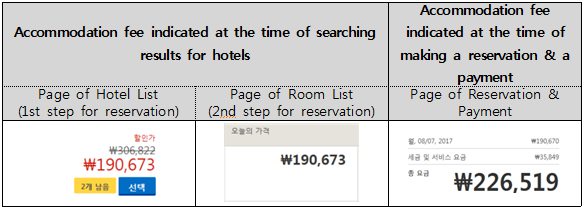| Consumers should pay attention to damage from overseas hotel booking sites providing insufficient information | ||||||||||||||||||||||||||||||||||||||||||||||||||||||||
|---|---|---|---|---|---|---|---|---|---|---|---|---|---|---|---|---|---|---|---|---|---|---|---|---|---|---|---|---|---|---|---|---|---|---|---|---|---|---|---|---|---|---|---|---|---|---|---|---|---|---|---|---|---|---|---|---|
| Regit Date | 2017-11-22 17:06:55 | Count | 239 | |||||||||||||||||||||||||||||||||||||||||||||||||||||
| Files | ||||||||||||||||||||||||||||||||||||||||||||||||||||||||
|
Consumers should pay attention to damage from overseas hotel booking sites providing insufficient information regarding cancellations and refunds
- Attention needs to be paid to Booking.com and Agoda which show low consumer damage compensation rates (below 30%) - As more and more people travel overseas for their vacations, online hotel bookings are expected to grow. The Korea Consumer Agency (KCA) conducted an investigation into consumer damage compensation rates as well as information provision regarding cancellations, refunds and fees by 4 leading global online hotel booking sites.
□ No proper and sufficient indications of information regarding ‘total accommodation fees’ and cancellations/refunds are given. According to the results of the investigation, most booking sites* show accommodation fees excluding taxes and service fees when consumers search results for hotels on their websites, and the sites only indicate ‘total accommodation fees’ including taxes and service fees at the time of making a reservation after choosing a hotel, causing confusion among consumers or misleading consumers. *In some cases, Booking.com indicates accommodation fees including taxes at a time when consumers search results for hotels on its website. [ Current State of Information Provision in relation to ‘Total Accommodation Fees’ (example) ]
As for information regarding cancellations and refunds, ‘Expedia’ and ‘Hotels.com’ have highlighted the ‘Non-Refundable’ clause in bold, red letters so that consumers can pay attention when making a contract. On the other hand, ‘Booking.com’ and ‘Agoda’ have shown the ‘Non-Refundable’ clause without any highlighting. In particular, in some cases, the ‘Special Conditions’ clause has been used instead of the ‘Non-Refundable’ clause, making it difficult for consumers to identify whether the concerned products are non-refundable. In addition, it turns out that consumers should pay attention when making a contract because 3 sites except for ‘Expedia’ do not provide consumers with important information including cancellation fees and deadlines for free cancellations, or even if the information is given, consumers should hover their mouse cursor over a specific mark or symbol to see the information. [ Current State of Indication regarding Cancellation and Refund ]
1) There exist some products showing a sign saying ‘Booking Conditions’ or ‘Special Conditions’ instead of ‘Non-Refundable’. 2) There are extremely rare cases where information regarding free cancellation deadlines is provided only when consumers hover their mouse cursor over a specific mark or symbol. 3) Information can be seen only when consumers hover their mouse cursor over a specific mark or symbol, or click on a specific mark or symbol. □ Attention needs to be paid to Booking.com and Agoda whose damage compensation rates are significantly low (below 28%) An analysis of consumer damage cases related to online hotel booking sites reported at the KCA in 2016 shows that the damage compensation rates of ‘Expedia’ and ‘Hotel.com’ are 82.4% and 67.5 respectively, while ‘Booking.com(27.3%)’ and ‘Agoda(20.0%)’ show significantly low damage compensation rates. [ Rate of Compensation for consumer damage by online hotel booking site in 2016 ]
* Compensation for consumer damage: refund, indemnification, contract cancellation/termination, contract fulfilment, correction of unfair practices, etc. Based on the investigation results, the Korea Consumer Agency(KCA) plans to strongly recommend the online hotel booking sites in question to 1) improve any indications and clauses that may mislead consumers, and also 2) take necessary actions for the protection of Korean consumers so that a safe environment for global online hotel booking can be created. Furthermore, the KCA is making every effort to provide consumers with more efficient redress with regard to overseas purchase by 1) taking various actions such as signing MOUs with consumer protection organizations in countries where international transactions are active, and 2) securing contact details of business operators who frequently cause damage to consumers in those countries. In addition, the KCA has been operating its ?Cross Border Transaction Consumer Portal(http://crossborder.kca.go.kr)? to help consumers do safe cross border transactions. The KCA says that it is desirable to refer to the ’Guidelines for Users of Overseas Online Shopping Sites’ and the ’Checkpoints for Preventing Damage from Overseas Online Shopping’ posted on the Portal if consumers wish to prevent any possible damage from overseas direct purchase. * MOU signing countries: 8 countries (the U.S., Japan, Thailand, Vietnam, Singapore, Hong Kong. etc.)
|
||||||||||||||||||||||||||||||||||||||||||||||||||||||||
| Next | Black Friday online shoppers can use a credit card chargeback in cases of suspected fraud, non-delivery, etc. | |||||||||||||||||||||||||||||||||||||||||||||||||||||||
| Prev | Korea Fair Trade Commission orders foreign online travel agencies to revise unfair refund policies | |||||||||||||||||||||||||||||||||||||||||||||||||||||||



